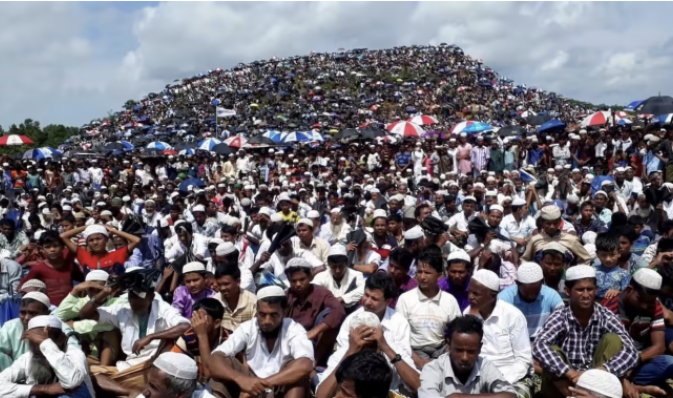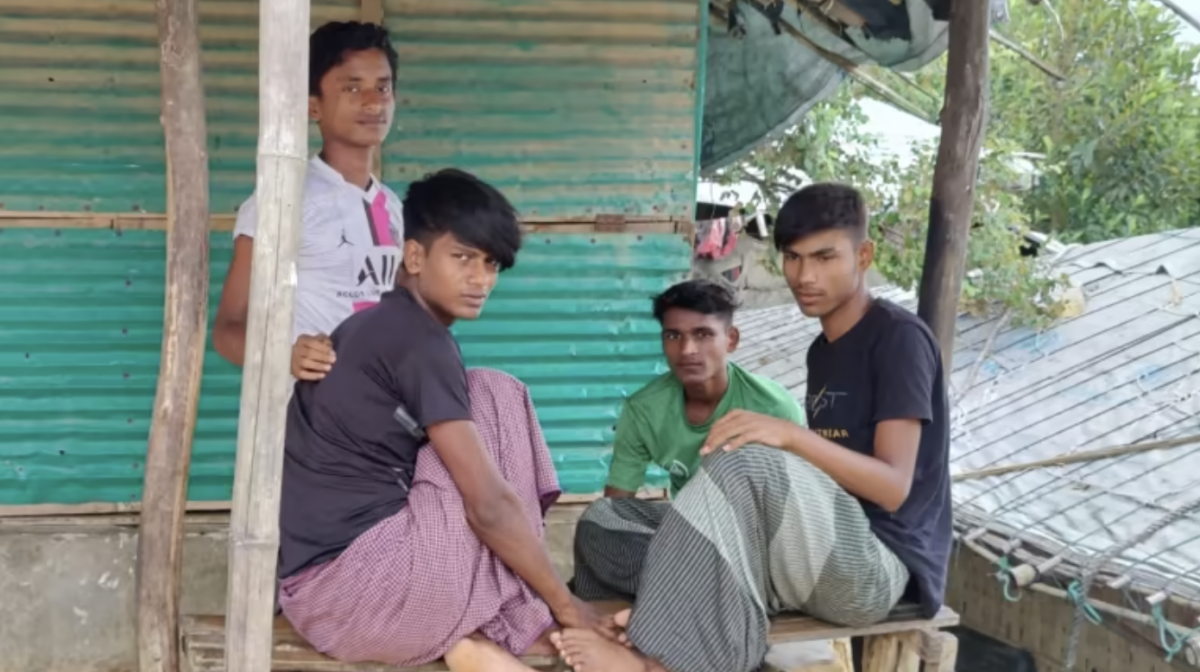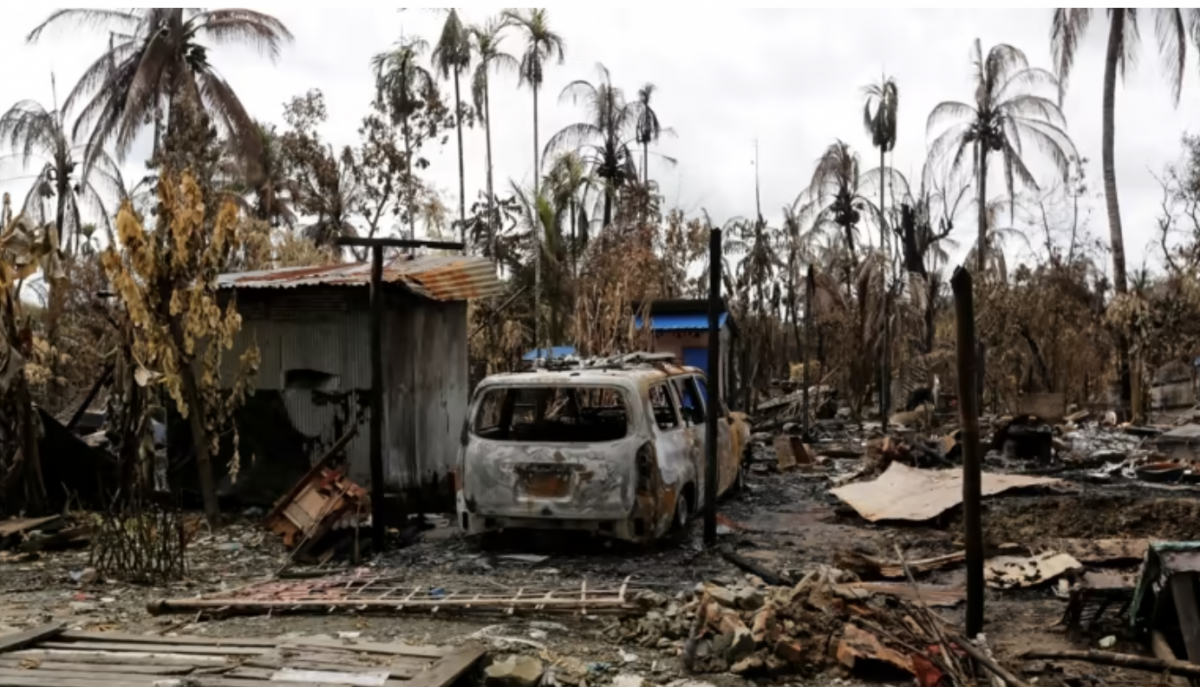
Maung Zarni, a U.K.-based Burmese human rights activist, agreed that as long as the military that "institutionalized the intentional destruction of Rohingyas [is in power] the repatriation has zero chance."
By Faisal Mahmud | Nikkei Asia | August 25, 2022
Military control in Myanmar keeps millions in Bangladesh limbo
COX'S BAZAR, Bangladesh -- As headmaster Nur Kabir was preparing to teach a seventh-grade science lesson to Rohingya refugees in southern Bangladesh earlier this year, armed police came and locked the door to the makeshift schoolhouse.
Schools like Kabir's, fashioned out of bamboo and tarpaulins, were lifelines for thousands of Rohingya children whose families fled violent persecution in Myanmar. The authorities were acting on a decision by the Refugee, Relief and Repatriation Commissioner (RRRC) office -- responsible for humanitarian assistance -- that said the unsanctioned private schools in camps "must be shut down."
The school closures were just one of many reminders that the largely Muslim refugees in Bangladesh lead a precarious existence, losing hope of safely returning to their now military-ruled homeland and unwanted everywhere else.
That stark reality looms especially large this week as the community marks the fifth anniversary of what Rohingya now call "Genocide Day" on Thursday.
It was on Aug. 25, 2017 that a group of Rohingya insurgents attacked Myanmar military posts. In retaliation, the country's armed forces launched a merciless counterattack in the swampy Maungdaw district of western Myanmar's Rakhine State. The death and destruction, during which entire Rohingya townships were torched, sent around 750,000 refugees streaming across the border into Bangladesh. There, they joined more than 200,000 of their Rohingya brethren who had escaped earlier violence.
The refugees remain marooned in southern Bangladesh, living in shacks across a total of 34 camps which together form the world's largest single refugee cluster.
Faizul Haque, 50, is frustrated by the current state of insecurity but thankful he survived the Myanmar crackdown that United Nations investigators found to have had "genocidal intent." The U.S. has also said it amounted to genocide.
"They killed three members of my family including my son," Haque said. "We fled with our lives."
Myanmar's regime, which denies allegations of atrocities, has tried and so far failed to get a Rohingya-related case dismissed at the International Court of Justice.

Abdur Rahim, leader of the Arakan Rohingya Society for Peace and Human Rights, told Nikkei Asia that concerns in the camps have shifted from everyday survival to worries about the future. The Bangladesh government has organized several official repatriation attempts that have failed because refugees, despite a widespread desire to return, fear further oppression and abuse in Myanmar.
"We are not living a life of dignity here but at least it is safe," Rahim said. "If we go back to Myanmar we will face persecution again."
Regina De La Portilla, a spokesperson for the United Nations High Commissioner for Refugees, told Nikkei that the Rohingya refugees want nothing more than to return to Myanmar, but only if they can do so voluntarily, safely and with dignity.
Few would argue that is realistic right now.
"Neither the refugees nor UNHCR consider that the current conditions in Myanmar provide for a safe return," she said, echoing U.N. rights chief Michelle Bachelet, who recently visited the Rohingya camps in Bangladesh and said the situation in Myanmar "is not right for the repatriation of Rohingyas."
This week, the UNHCR said its fund for Rohingya assistance was woefully "short of needs." Its 2022 response plan sought over $881 million, but it said only about half of that has been received.
"The most commonly unmet needs include proper nutrition, shelter materials, sanitation facilities and livelihood opportunities," the statement said.
Bangladesh has long wanted to be relieved of the burden and is caught in the throes of a worsening economic crisis that has prompted a request for an International Monetary Fund loan. But it too is losing faith in the chances of sending the refugees back, especially after the military ousted Myanmar's elected government of Aung San Suu Kyi in February 2021.
"The repatriation prospect is obviously bleak now," said Bangladesh's Additional Refugee, Relief and Repatriation Commissioner Mohammad Shamsud Douza.
Azeem Ibrahim, who authored the book "The Rohingyas: Inside Myanmar's Genocide," put it bluntly: "There is nowhere for the Rohingya to be repatriated to."

Ibrahim said that Myanmar has spent almost half a century trying to get rid of these people and that when it finally succeeded "they not only drove those people over the border to Bangladesh, they also mined the border to ensure they never come back."
"Besides, I fear that now the facade of democracy has been removed in Myanmar, the military will do as it pleases without ever having to even think," he said in reference to a potentially ineffective or indifferent international response.
Maung Zarni, a U.K.-based Burmese human rights activist, agreed that as long as the military that "institutionalized the intentional destruction of Rohingyas [is in power] the repatriation has zero chance."
So five years on, roughly a million people remain in limbo.
The limited access to educational opportunities is a case in point.
The Bangladesh government had never granted legal status to the refugee-led schools but did agree to a plan by humanitarian groups to support them in January 2020. But last December it reversed course and ordered them shut.
Kabir, the 28-year-old headmaster, had seen the writing on the wall even before April when police showed up at his school, which had been named Life Destination. In the preceding months, other schools with similarly hopeful names such as Newmoon and Newlight had been shuttered.
Mohammad Akram, a 16-year-old with a dream of becoming a doctor, was devastated when Life Destination closed. "This school gave me a chance to study," he said. "Now I am passing time in utter boredom. I don't have anything to do."









